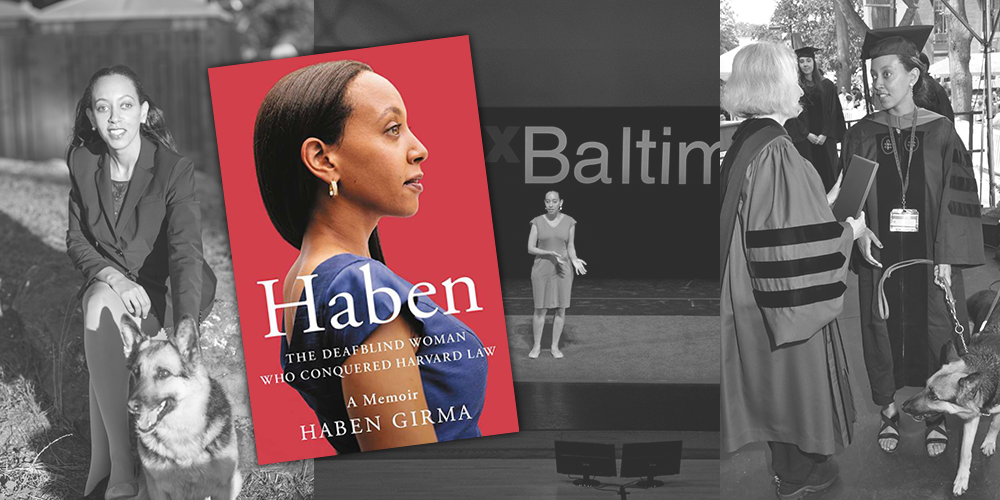The deafblind woman who conquered Harvard Law uses her personal journey and expertise to advocate for equal opportunities and inclusion for people with disabilities.
Haben Girma’s best-selling memoir, Haben: The Deafblind Woman Who Conquered Harvard Law, takes readers on a journey from her summers with extended family in Eritrea and her childhood in Oakland, California, to Harvard Law School and the White House. Along the way she illuminates the barriers to inclusion and challenges readers to experience the world from her perspective. She urges readers to reframe their attitudes and expectations for people with disabilities by viewing differences as assets.
Haben recently shared her insights with us on being deafblind, employment discrimination, the power of disability pride, and technological innovations that foster inclusion.
BENETECH: You identify as Deafblind. What does that mean to you?
HABEN: Deafblindness encompasses a spectrum of vision and hearing loss. Deafblind people use a variety of communication strategies to meet their needs — voice, text, sign, and more. The term “Deafblind” is the easiest and most direct way to refer to the very diverse group of people who live with both vision and hearing loss.
BENETECH: In the book you say, “Inclusion is a choice and happens when we remove barriers – physical, digital and attitudinal.” What are some ways that communities can remove attitudinal barriers for people with disabilities?
HABEN: Employers continue to wrongly assume that disabled job applicants cannot perform tasks that we in fact can perform. Employment discrimination hurts our entire community, and employers are missing out on incredible talent. Organizations need to train hiring managers to remove these attitudinal barriers and increase hiring of people with disabilities.
BENETECH: Haben means “pride” in Tigrinya, a language spoken in Eritrea and Ethiopia. Why did you choose this for the book’s title?
HABEN: Many people with disabilities struggle with shame. It grows and grows, becoming an internal barrier. Accepting a disability frees us to fully explore what we can do. Many stories cover the struggle to come to terms with a disability, and that is not my book. My book captures what it means to live, and thrive, with disability pride. I hope the book will encourage more people to celebrate the disability rights movement and become a member of the disability community, which includes non-disabled allies.
BENETECH: You have been a Bookshare member for over ten years – how has Bookshare helped you achieve your goals?
HABEN: Since I can’t watch film or TV, I rely heavily on books to learn about the world. The Bookshare library is a treasure trove of knowledge and having had access to it since high school has helped me tremendously. I hope more blind readers around the world gain access to this accessible library so they can explore any topic they desire. [Editor’s note: Bookshare is an ebook library that makes reading easier for people with dyslexia, blindness, cerebral palsy, and other reading barriers.]
BENETECH: What are some examples of innovation in the inclusion arena that you’re excited about?
HABEN: I’m excited for a future where accessible self-driving cars are a reality. People with disabilities stand to benefit the most from self-driving cars, but developers are not making accessibility enough of a priority. Waiting until a product is “finished” to start thinking about accessibility is like completing construction of a skyscraper and then tearing part of it down to install an elevator. Planning for accessibility from the start saves resources and results in an overall better product.
I partnered with Ericsson on a short film to spotlight the need for fully accessible autonomous vehicles. Technology designed with access in mind will advance equal opportunities for people with disabilities, increasing our ability to work, study, and travel with ease and freedom. The companies that choose to prioritize accessibility benefit from tapping into the significant market of over one billion people with disabilities around the world. If we plan for it, tech will create a barrier-free future.
BENETECH: You are a role model for so many people. What do you hope to accomplish through your advocacy work?
HABEN: Through writing, speaking, and advocating I hope to remove ableism from our society and increase opportunities for people with disabilities, especially in the area of employment.
Learn more about Haben, her book, and guidelines for creating positive disability stories.
Benetech shares and supports Haben’s advocacy work to remove barriers and increase inclusion for people with disabilities. We wish Haben continued success as a disability rights lawyer and a powerful catalyst for change.


Be First to Comment